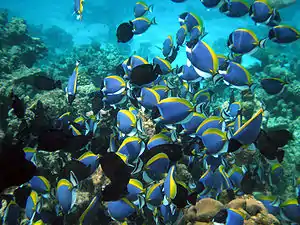Acanthurus leucosternon
Acanthurus leucosternon is a marine tropical fish belonging to the surgeonfish family, Acanthuridae. Its common names are powder blue tang and powder-blue surgeonfish.
| Powder-blue surgeonfish | |
|---|---|
 | |
| Scientific classification | |
| Kingdom: | Animalia |
| Phylum: | Chordata |
| Class: | Actinopterygii |
| Order: | Acanthuriformes |
| Family: | Acanthuridae |
| Genus: | Acanthurus |
| Species: | A. leucosternon |
| Binomial name | |
| Acanthurus leucosternon E. T. Bennett, 1833 | |
Description
The fish can reach an average size of 23 cm (9 in) in length.[1] The body has an oval shape and is compressed laterally. Like other surgeonfishes, Acanthurus leucosternon swims with its pectoral fins. The caudal fin has a crescent shape. The fish has a "surgeon's scalpel," an erected part of the spine located at the base of the tail.[2] The mouth is small and pointed in a beak-like manner with tiny and sharp teeth for reaching narrow spaces of food.[3] Its sides are blue;[3] its dorsal fin and the base of caudal fin are yellow;[3] the head is black;[3] the mouth, the throat area, the anal and pelvic fins are white.[4] The pectoral fins are transparent with yellow reflections. The intensity of its blue color shows off if the fish is healthy or not. The fish does not undergo color changes as it matures; as some tangs, surgeonfish and unicornfish do.
Distribution and habitat
Acanthurus leucosternon is found in tropical waters from the Indian Ocean.[5] The species inhabits shallow and clear coastal waters always associated with a reef. It prefers flat top reefs and areas along seaward slopes.[5]
Behaviour
The powder blue tang, like most fish in the family Acanthuridae, is herbivorous, eating mostly benthic algae.[6] Acanthurus leucosternon has a diurnal activity. It is solitary, territorial and aggressive with other surgeonfish.[1] In cases where food is plentiful, it may feed in shoals, but in cases of scarcity, it may compete individually for food.[3] It may use its surgeon's scalpel as a defensive weapon.[1]
Economic value

The powder blue tang is rarely harvested for anything other than the marine aquarium industry. It is a commonly sold fish that is moderately difficult to care for, although its popularity is easily exceeded by the Blue tang and Yellow Tang. They are very prone to Cryptocaryon irritans.[1] They are reef safe and are compatible with most species except other species of fish in the genus Acanthurus.[1]
References
- Lougher, Tristan (2006). What Fish?: A Buyer's Guide to Marine Fish. Interpet Publishing. p. 111. ISBN 0-7641-3256-3.
- Clipperton, John (1 September 2013). "Powder Blue Tang – Acanthurus leucosternon". Marine Habitat magazine. Fish Junkies Ltd. Archived from the original on 14 February 2014. Retrieved 13 February 2014.
- DK Publishing (17 January 2011). Animal Life: Secrets of the Animal World Revealed. DK Publishing. p. 188. ISBN 978-0-7566-8886-8.
- Andreas Vilcinskas, La vie sous-marine des tropiques, Vigot, 2002, 475 p. (ISBN 2711415252), p. 366
- "Facts about Powder Blue Tang (Acanthurus leucosternon) - Encyclopedia of Life". Eol.org. Retrieved 2014-01-04.
- Froese, Rainer and Pauly, Daniel, eds. (2004). "Acanthurus leucosteron" in FishBase. January 2004 version.
Further reading
- Robertson, Ross; Polunin, Nicholas; Leighton, Kimberley (1979). "The behavioral ecology of three Indian Ocean surgeonfishes (Acanthurus lineutus, A. leucosternon and Zebrusoma scopes): their feeding strategies, and social and mating systems". Environmental Biology of Fishes. 4 (2): 125–170. doi:10.1007/BF00005448.
External links
- Acanthurus leucosternon at Fishbase
- Tang at Wetwebmedia.com
- Powder Blue Tang
- Atos Origin
- http://www.marinespecies.org/aphia.php?p=taxdetails&id=219628
- Photos of Acanthurus leucosternon on Sealife Collection
| Wikimedia Commons has media related to Acanthurus leucosternon. |

